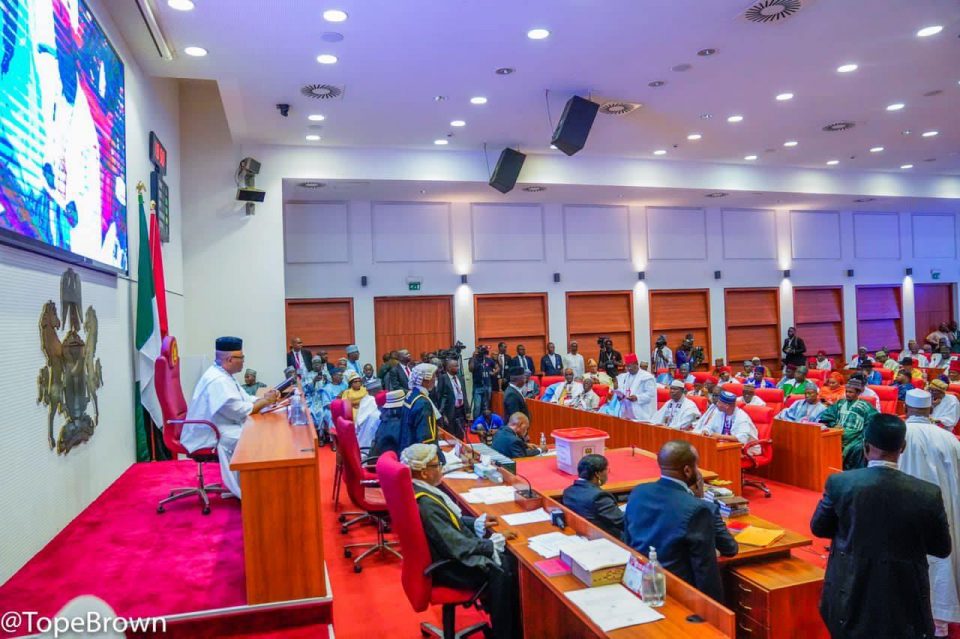
The Nigerian Senate is considering a legislative proposal that would increase the number of Supreme Court Justices from the current 21 to 30 in a bid to tackle the mounting backlog of cases and improve the efficiency of the apex court.
Senator Osita Izunaso (Imo West), who is sponsoring the bill, disclosed this during a press briefing in Abuja on Friday to mark his two years in the 10th National Assembly.
He argued that the current number of justices is inadequate, despite the recent appointment of 11 justices in 2023 that finally filled the constitutional quota for the first time in Nigeria’s history.
“Even with the full complement of 21 justices, the Supreme Court is overwhelmed. The volume of cases reaching the court daily is alarming. Some litigants are being given hearing dates as far ahead as 2027 and 2028,” Izunaso stated.
According to him, the proposed legislation would enable the apex court to form more panels to expedite the adjudication process.
“Supreme Court justices typically sit in panels of five, or seven for constitutional matters. If we have 30 justices, it allows the formation of at least five panels simultaneously. That way, more cases can be handled at a faster pace,” he said.
Apex court not for settling village land disputes
Izunaso’s proposal however goes beyond just increasing the number of judges.
The senator is also advocating a major reform in the type of cases the Supreme Court entertains, calling for an end to what he described as the “judicial congestion caused by trivial matters.”
He questioned the rationale behind allowing cases such as land disputes, tenancy disagreements, and divorce battles to reach the highest court in the land.
“Why should a land matter in my village end up in the Supreme Court?” he asked.
“Many of these issues should start from the Customary Court and end at the High Court.”
The people at those levels understand the context better. The apex court should be reserved for cases of national or constitutional importance, things like terrorism, homicide, and grand corruption.”
Do you know that even tenancy disputes, like ‘pay me my rent’ or ‘my landlord kicked me out’, go all the way to the Supreme Court? This is clogging the system and delaying justice for more critical matters.”
The lawmaker recalled a personal legal experience where a case involving deceased parties was only scheduled for hearing three years after resolution had been reached among their descendants.
“The case was fixed for 2026, even though the matter had already been settled. That’s an indictment of our system,” he lamented.
While some legal reform advocates have suggested the establishment of regional Supreme Courts, Izunaso firmly rejected the idea.
He insists Nigeria should maintain a single national Supreme Court, but drastically reduce the volume of cases that reach it.
“A unitary Supreme Court preserves the sanctity and unity of our judicial system. What we need is better filtration at lower level, not more Supreme Courts,” he said.
Applauds Tinubu’s Posthumous Recognition of Prof. Nwosu
On a separate note, Senator Izunaso praised President Bola Ahmed Tinubu for conferring a posthumous national honour on the late Professor Humphrey Nwosu, former Chairman of the defunct National Electoral Commission, who oversaw the June 12, 1993, presidential election widely regarded as the freest and fairest in Nigeria’s history.
Nwosu was posthumously awarded the Commander of the Order of the Niger during the June 12 Democracy Day celebrations.
Describing the honour as a “bold and commendable step,” Izunaso recalled how he and others had long advocated for national recognition for the late electoral umpire.
“I think the president has done the right thing. In fact, I urge him to go a step further by naming the national headquarters of the Independent National Electoral Commission after Professor Nwosu,” he said.
“I was among those who sponsored a motion in the Senate for his recognition. Even when that motion failed, we stood our ground. Today, we feel vindicated.”
